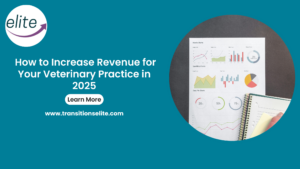Tax Consequences of Selling a Veterinary Practice (In 2024)
Selling your veterinary practice can be an opportunity to explore new chapters in your life. However, selling a veterinary practice can be a significant financial decision, one that takes careful planning and research. Before you decide to move forward with this monumental transaction, it is important to understand the tax consequences of selling a veterinary practice.
Taking the time to research and become well-informed about tax implications that come along with selling your practice can offer a wide variety of benefits. This includes aiding you in making strategic decisions, avoiding any surprises and unexpected consequences, and maximizing your financial benefits.
What Are the Tax Consequences of Selling a Veterinary Practice?
The tax consequences of selling a veterinary practice depend on how the business is organized (e.g., C-Corp, S-Corp, LLC) and the deal’s structure. Sellers may face both capital gains taxes and income taxes based on these factors.
Understanding the Basics of Business Sales and Taxes
One of the first steps in understanding the basics of business sales and the tax implications that go along with this important decision is learning about the different types of business sales. It is also important to understand the basic tax considerations that are associated with selling a practice.
Types of Business Sales
When you’re looking into selling your veterinary practice, you will encounter two different types of business sales: asset sales and share sales.
Asset Sale
During an asset sale, you will maintain ownership of the corporate entity, but you will no longer own some or all of the assets attached to the practice. This can include both tangible and intangible assets, such as trademarks, equipment, or inventory. Asset sales are considered cash-free, debt-free transactions.
Share Sale
A share sale is also known as a stock sale. During this type of business sale, buyers will purchase shares from the company, each of which represents ownership. These are often less complex than asset sales, as the assets are tied directly to the company and won’t need to be sold individually in a share sale.
Tax Considerations of Selling a Veterinary Practice
Both an asset sale and a share sale have their own advantages and disadvantages. However, when you contemplate this significant decision, it is important to consider the role of taxes as well.
There are two main types of taxes that you will encounter when looking to sell your veterinary practice: capital gains tax and income tax. These will apply to different aspects of your business during the sale, varying on the asset being sold and the type of business structure (i.g. sole proprietorship or LLC).
These aren’t the only taxes that will impact this important transaction, however. You may also be subject to federal, state, and other local taxes, depending on where you are located.
Key Tax Consequences When Selling a Veterinary Practice
There are various factors that can affect the tax consequences of selling a veterinary practice. Many of these and their impact may vary depending on the location, type of sale, and business structure of your veterinary practice.
Capital Gains Tax (CGT)
As mentioned previously, you are likely to encounter a capital gains tax when you sell your veterinary practice. In order to calculate your capital gains tax, you’ll need to determine your basis and the realized amount.
The basis is how much you initially paid for the purchase of your asset. This includes the purchase price itself along with any fees or commissions. Your realized amount is how much you sold the asset for.
If you are able to sell your asset for more than you initially spent (your basis), you’ll have what is known as a capital gain. If your asset has lost value and sells for less than the basis, then you have a capital loss. Capital losses can be used to help offset your capital gains.
Goods and Services Tax (GST)
The goods and services tax is a federal tax applied indirectly. It is a value-added tax that is applied to the cost of a product or service. If your veterinary practice is located in the United States, this will not apply to your sale. This is because the United States does not use the goods and services tax or a value-added tax style.
Instead, the primary form of indirect tax in the United States is sales tax.
Depreciation Recapture
Occasionally, an asset will lose some of its value over time, which is known as depreciation. Depending on the asset, this depreciation can cause you to experience a loss, as it is now valued at a price less than what you initially paid.
However, although an asset may be valued at less, a buyer may be willing to pay more than the current price (but less than the original price) of that asset. The difference between the current value and what the buyer purchases it for can result in a gain, even if you experienced an overall loss compared to your basis.
Impact of Ownership Structure
There are several different ownership structures that may apply to your veterinary practice. As mentioned previously, these can impact the type and amount of taxes that you pay. It also affects how many times you are taxed.
In a sole proprietorship or partnership, you will only experience taxes based on the amount you earn when selling the business. However, once you reach a corporate level, you may face double taxation. The corporation overall will face taxation, and you will also face taxation on your share of the amount made during the sale.
Tax Planning Strategies
Although you will need to pay taxes on the sale of your veterinary practice regardless of how the sale is conducted, there are various tax planning strategies that can help you best navigate this transaction. This includes timing your sale during optimal parts of the fiscal year in order to minimize liabilities, structuring the sale to receive the most benefits from asset and share sales, and using losses to help offset gains.
You’ve dedicated time, passion, and energy to building your veterinary practice. Ensuring the best possible sale situation for your business goes beyond maximizing profits. Instead, you’ll want to focus on ensuring a seamless transaction is beneficial for you and your veterinary practice.
Because of this, when researching tax planning strategies and working toward the sale, it is best to work with a trusted broker.
At Transitions Elite, our professional team is dedicated to helping you not only secure the highest value possible but also the best terms. One client, Dr. Mallory located in the Midwestern United States, was looking to sell their practice for around $4 million. Instead, they ended with a final offer of $12.5 for the practice they dedicated so much time to.
As described by Dr. Lonnie & Naomi Davis of Ohio, Transitions Elite “holds your hand through the whole selling process”, helping you understand what to expect every step of the way.
Common Pitfalls and How to Avoid Them
Navigating the tax consequences of selling a veterinary practice can be challenging. Here are several common pitfalls and how to avoid them:
- Underestimating Tax Liabilities: Just like with income taxes, it is important to make accurate decisions regarding the taxation on your sale. Estimating too little can lead to financial and legal repercussions, and it may cost you more in fees or penalties.
- Neglecting State and Local Taxes: Capital gains and income taxes are important to consider when selling your practice. However, it is also of the utmost importance that you do not neglect state and local taxes, such as sales tax.
- Not Learning Local Requirements: In the United States, the exact taxes you are required to pay on a sale can depend on your location. This includes on state and county levels. Take the time to research local tax requirements and properly prepare prior to selling your practice.
Examples of the Tax Consequences of Selling a Veterinary Practice
In an ideal situation, selling your veterinary practice will be a peaceful new beginning. Taking the time to properly research and plan, along with working alongside professionals, can help maximize your financial gain from the sale of your business while reducing any losses.
However, in a challenging scenario, you may find yourself struggling to navigate the tax consequences of selling a veterinary practice. This can lead to unnecessary losses or even penalties and fees. One of the best ways to avoid this outcome is by carefully researching and working with professional brokers like those at Transitions Elite.
Conclusion
The tax consequences of selling a veterinary practice can be complex, leaving you to navigate federal and local taxes on the sale of your business. However, while it can be daunting, this isn’t a task you’ll need to go through alone.
Reach out to Transitions Elite today to receive a free practice valuation. We believe owners are the heart of selling a business, and we want to ensure that you have the tools, knowledge, and resources to make the best decisions for the future of your practice.
Note – The information provided in this article is for informational purposes only. Consult with a qualified tax professional for tax advice.

Melani Seymour, co-founder of Transitions Elite, helps veterinary practice owners take action now to maximize value and secure their future.
With over 15 years of experience guiding thousands of owners, she knows exactly what it takes to achieve the best outcome.
Ready to see what your practice is worth?











